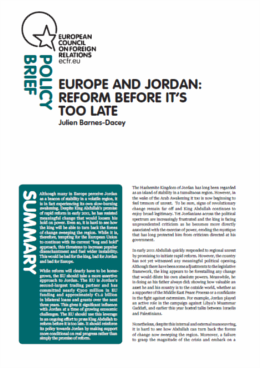Jordan: Reform before it’s too late
Europe should take a more assertive approach to political reform in Jordan
Jordan is experiencing a slow-burning awakening. Inspired by regional revolutions and in the face of deepening political and economic malaise, King Abdullah is confronting unprecedented levels of discontent from both the traditional opposition and his longstanding support base. Despite a promise of rapid reform in early 2011 and subsequent tinkering of the legislative system, the King has nonetheless resisted meaningful change that would loosen his absolute hold on power. In the current regional climate the absence of an orderly reform process risks widening instability.
While Jordanian reform clearly has to be home-grown, Europe should take a more assertive approach. In addition to the historic strength of political ties, the EU is Jordan’s second-largest trading partner and has committed nearly €300 million in direct funding and approximately €1.2 billion in bilateral loans and grants over the next three years. This gives it important influence.
In a new ECFR policy brief senior Middle East policy fellow Julien Barnes-Dacey argues that Europe should use this leverage to press King Abdullah to introduce meaningful reform before it is too late, suggesting specific areas of immediate focus. Europe should reinforce its policy towards Jordan by tying ongoing support to reform that moves the country towards a meaningful parliamentary democracy. Europe’s current policy of offering the King unwarranted praise for a half-hearted reform process will not benefit the monarch, Jordan or Europe.
Contact: [email protected] , +44 (0)7584638614 twitter:@jbdacey
Jordan could become a positive model for the wider region – but only if it acts soon. Europe should take a more assertive stand to persuade King Abdullah to liberalise before it is too late. Europe must be willing to back up the new prioritisation of its southern neighbourhood with more meaningful action.
– Julien Barnes-Dacey
European policy towards Jordan should include:
- Increased political pressure: Europe’s willingness to act on its commitment to reform is currently not taken seriously in Jordan. While maintaining its firm alliance with Amman, Europe should curtail its open-ended, blanket praise for the King and should push back negotiations for a deep and comprehensive free trade agreement (DCFTA) until there are tangible signs of a meaningful opening of the political system.
- Europe should prioritize two immediate goals, enhanced freedoms of expression and civil society: Europe should press King Abdullah to advance changes to the legal system that decriminalise expression crimes, while also taking up the case of Jordanians arrested on these charges. Europe should also actively press for a loosening of restrictions on local civil society and should make this a prominent and public issue in bilateral relations.
- Increased coordination with the US and Gulf States: European policy towards Amman will only be effective if coordinated with other key external actors – namely the US and Gulf States. It is in the interest of all parties to ensure an orderly Jordanian reform process and Europe should reach out to coordinate a united message. Gulf countries, in particular, should be encouraged to view this as a surer way of preventing unrest from seeping into monarchical states.
- Widening political engagement: Europe should open a political dialogue with representatives from across the political spectrum, particularly the Muslim Brotherhood’s Islamic Action Front (IAF). European credibility will be significantly enhanced by pre-emptively engaging with these groups rather than waiting for them to emerge in power as has been the case elsewhere in the region.
- Ongoing economic support and technical assistance: Europe should offer Jordan increased aid to help it overcome pressing economic challenges. However, this support should be directly tied to progress on political reform and should focus on regional governates and SMEs. In the short-term business-to-business contacts between Jordan and Europe should also be strengthened. Meanwhile, Europe should offer technical expertise to support the development of key reform measures such as new electoral and political parties laws.
Notes for editors:
- This paper, like all ECFR publications, represents the views of its author, not the collective position of ECFR or its Council Members.
- The European Council on Foreign Relations (ECFR) is the first pan-European think-tank. Launched in October 2007, its objective is to conduct research and promote informed debate across Europe on the development of coherent and effective European values based foreign policy.
The European Council on Foreign Relations does not take collective positions. ECFR publications only represent the views of their individual authors.



